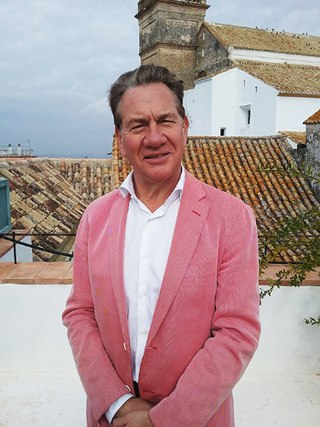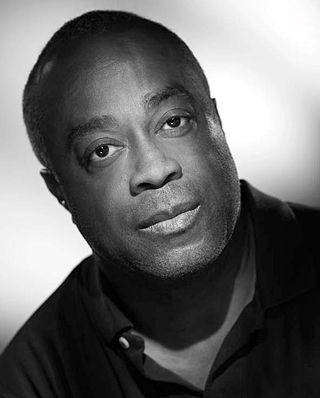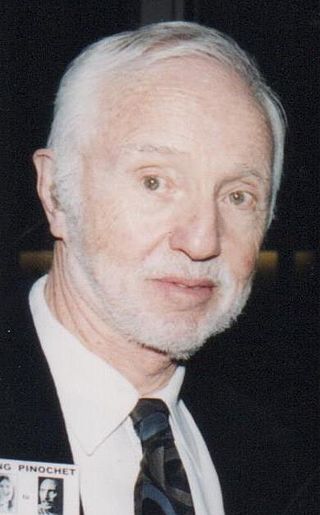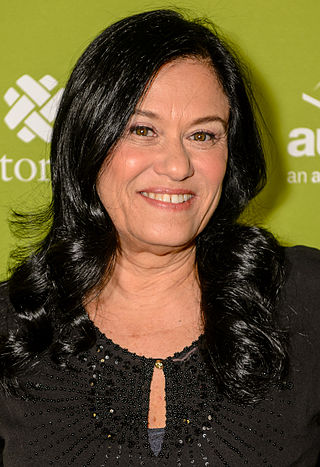
The Living Desert is a 1953 American nature documentary film that shows the everyday lives of the animals of the desert of the Southwestern United States. The film was written by James Algar, Winston Hibler, Jack Moffitt (uncredited) and Ted Sears. It was directed by Algar, with Hibler as the narrator and was filmed in Tucson, Arizona. The film won the 1953 Oscar for Best Documentary.

William McChord Hurt was an American actor. Known for his performances on stage and screen, he received various awards including an Academy Award, BAFTA Award and Cannes Film Festival Award for Best Actor.

Michael Denzil Xavier Portillo is a British journalist, broadcaster, and former Conservative Party politician. His broadcast series include railway documentaries such as Great British Railway Journeys and Great Continental Railway Journeys. A former member of the Conservative Party, he was Member of Parliament (MP) for Enfield Southgate from 1984 to 1997 and Kensington and Chelsea from 1999 to 2005.

Twentieth Century is a 1934 American pre-Code screwball comedy film directed by Howard Hawks and starring John Barrymore and Carole Lombard. Much of the film is set on the 20th Century Limited train as it travels from Chicago to New York City. Ben Hecht and Charles MacArthur adapted their 1932 Broadway play of the same name – itself based on the unproduced play Napoleon of Broadway by Charles Bruce Millholland – with uncredited contributions from Gene Fowler and Preston Sturges.

Agnès Varda was a Belgian-born film director, screenwriter, photographer, and artist with French and Greek origins.

Heather Elizabeth Langenkamp is an American actress, writer, director, disc jockey, and producer. Although she has acted in many film genres, she is primarily known for her work in horror films, in addition to her work on television sitcoms. Langenkamp has been referred to as a scream queen and was inducted into the Fangoria Chainsaw Hall of Fame in 1995.

Charles Burnett is an American film director, film producer, writer, editor, actor, photographer, and cinematographer. His most popular films include Killer of Sheep (1978), My Brother's Wedding (1983), To Sleep with Anger (1990), The Glass Shield (1994), and Namibia: The Struggle for Liberation (2007). He has been involved in other types of motion pictures including shorts, documentaries, and a TV series.

Haskell Wexler, ASC was an American cinematographer, film producer, and director. Wexler was judged to be one of film history's ten most influential cinematographers in a survey of the members of the International Cinematographers Guild. He won the Academy Award for Best Cinematography twice, in 1966 and 1976, out of five nominations. In his obituary in The New York Times, Wexler is described as being "renowned as one of the most inventive cinematographers in Hollywood."

Barbara Kopple is an American film director known primarily for her documentary work. She is credited with pioneering a renaissance of cinema vérité, and bringing the historic french style to a modern American audience. She has won two Academy Awards, for Harlan County, USA (1977), about a Kentucky miners' strike,[1] and for American Dream (1991), the story of the 1985–86 Hormel strike in Austin, Minnesota,[2] making her the first woman to win two Oscars in the Best Documentary category.

Lourdes Portillo is a Mexican film director, producer, and writer.

Blanca Portillo Martínez de Velasco is a Spanish film, television, and stage actress. She has also worked as theatre director and producer. She made her feature film debut in Entre rojas (1995). She became popular for her portrayal of Carlota in sitcom television series Siete vidas. Portillo is the recipient of numerous accolades, including a Goya Award for Best Actress.

Maya Lin: A Strong Clear Vision is a 1994 American documentary film made by Freida Lee Mock.
International Documentary Association (IDA), founded in 1982, is a non-profit 501(c)(3) that promotes nonfiction filmmakers, and is dedicated to increasing public awareness for the documentary genre. Their major program areas are: Advocacy, Filmmaker Services, Education, and Public Programs and Events.

The National Film Registry (NFR) is the United States National Film Preservation Board's (NFPB) collection of films selected for preservation, each selected for its historical, cultural, and aesthetic contributions since the NFPB's inception in 1988.
Union Maids is a 1976 American documentary film directed by Jim Klein, Julia Reichert and Miles Mogulescu. It was nominated for an Academy Award for Best Documentary Feature. The film was based on the three women from Chicago in the labor history book Rank and File by Staughton Lynd and Alice Lynd.
The Mothers of Plaza de Mayo is a 1985 Argentine documentary film directed by Susana Blaustein Muñoz and Lourdes Portillo about the Mothers of the Plaza de Mayo. It was nominated for an Academy Award for Best Documentary Feature.
Rosa-Linda Fregoso is the Professor and former Chair of Latin American and Latino Studies at the University of California, Santa Cruz.

Sheila Nevins is an American television producer and head of MTV Documentary Films division of MTV Studios. Previously, Nevins was the President of HBO Documentary Films. She has produced over 1,000 documentary films for HBO and is one of the most influential people in documentary filmmaking. She has worked on productions that have been recognized with 35 News and Documentary Emmy Awards, 42 Peabody Awards, and 26 Academy Awards. Nevins has won 31 individual Primetime Emmy Awards, more than any other person. She is also a member of the Peabody Awards board of directors, which is presented by the University of Georgia's Henry W. Grady College of Journalism and Mass Communication.
Connie Field is a director of documentary features.

Julia Bell Reichert was an American Academy Award-winning documentary filmmaker, activist, and feminist. She was a co-founder of New Day Films. Reichert's filmmaking career spanned over 50 years as a director and producer of documentaries.















